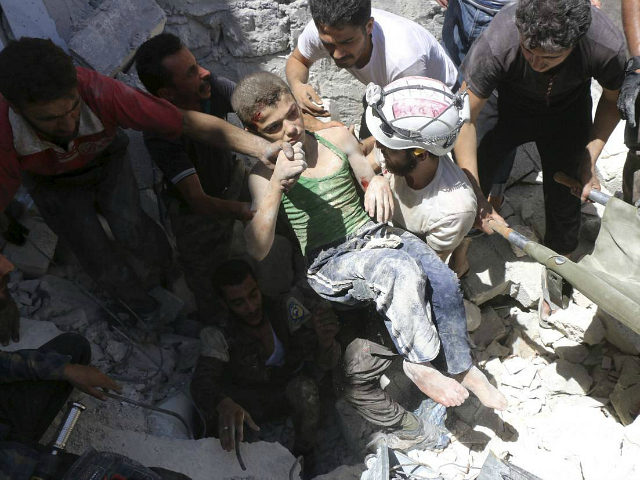It was more than a little discordant to hear Russian Foreign Minister Sergey Lavrov tell the U.N. General Assembly on Friday that it is “essential to prevent disruption” of the Syrian ceasefire agreement, while Syrian warplanes — allegedly with Russian help — were showering bombs on the besieged city of Aleppo, with a ground operation waiting in the wings.
Lavrov nevertheless plowed ahead with his prepared remarks, simultaneously boasting that Russia had helped defeat the Syrian opposition, and kick-started a “meaningful political process so that the Syrians could determine the future of that country.”
The Russian minister even called for “impartial investigation of the incidents in Deir ez-Zor and Aleppo” — the bombing of Syrian troops by American warplanes, which the U.S. says was accidental, and the bombing of a U.N. relief convoy, which the U.S. blamed on Russia — so that no one could “undermine” or “sabotage the agreed plans of Syrian settlement.” He said this while the corpses of entire families were being pulled from the ruins of Aleppo, and the Syrian government was deliberately targeting airstrikes against volunteer rescue workers.
Lavrov kept to the Russian-Syrian-Iranian line that Assad’s opponents are mostly “terrorists,” and the United States has prolonged the Syrian civil war unnecessarily by arming them:
It is of cardinal importance to fulfil the demand by the UN Security Council to dissociate the so-cailed moderate opposition from terrorists, and a particular responsibility in this regard lies with the US and members of the US-led coalition.
The Syrian crisis would not be resolved, and the appalling humanitarian situation would not be rectified, without suppressing ISIS, Jabhat al-Nusra, and their associate extremist groups. This is a key condition for strengthening the cessation of hostilities regime and overall national truce.
Lavrov also saw terrorists and saboteurs at work in Ukraine:
Ukraine, a country close to us, has also fallen victim of those who enjoy zero-point games; its development has been undermined by the anti-Constitutional coup, and now is falling apart as a result of the new authorities’ refusal to implement the Minsk Agreement of February 12, 2015.
It has already become obvious to all, including Kiev’s patrons, that the expectations to use the Ukrainian crisis for achieving corrupt geopolitical goals have no prospects. We hope that the life itself will compel them to realize all these measures signed by the Ukrainian leaders in Minsk.
He came back to “terrorism” later in his remarks, declaring that “the tragedies in Iraq, Libya, Yemen, and Syria proved the need to stop timeserving attempts to use extremists for advancing geopolitical intentions,” and warning that “terrorist and extremist ideology literally holds the youth hostage in various regions of the world.” Russia has long prodded the U.S. to accept the legitimacy of the Assad regime in Syria, and cease supporting Assad’s opponents, so a combined effort against terrorist groups can be made.
He had the cheek to invoke George Orwell, quoting the famous “all animals are equal, but some are more equal than others” line to hector certain other global powers:
In the enlightened twenty-first century, it is simply indecent to mentor everyone around, reserving for oneself the right to use doping or launch unilateral adventures bypassing the UN, or conduct geopolitical experiments that cost millions of human lives, or engage in extraterritorial blackmail of all, including closest allies, when the financial profit “for ours” is at stake; or even to claim the right to set criteria of greatness of that or another country. It is unworthy of principles of freedom and equality on which great nations grew up and which are used by their elites to threaten the entire world.
Lavrov referenced the Nuremberg trials at the end of World War II to declare that “the freedom of expression or peaceful assembly should not be used as a cover for condoning radical movements that profess the Nazil ideology, and support the glorification of the Nazi and their accomplices.” Russia has been worried about neo-Nazism in Europe for some time but also likes to describe the government of Ukraine as Nazis.
He criticized North Korea’s nuclear and ballistic missile programs, saying, “actions by the DPRK that violate U.N. Security Council resolutions must be stopped” and calling on Pyongyang to “abandon its nuclear missile programs.” He also said it was “inadmissible to use this situation as a pretext for massive militarization of North-East Asia, and deployment of another position area for U.S. global missile defense there.”
A good deal of Lavrov’s address focused on the importance of respecting national sovereignty (in everything except climate-change programs, which he said Russia energetically supports), to help humanity in “its transition from bipolar and unipolar world order.”
President Obama wanted to usher in the post-American era, but Russia had more detailed strategies ready for playing on that altered game board, as the brutal Syrian endgame illustrates.

COMMENTS
Please let us know if you're having issues with commenting.